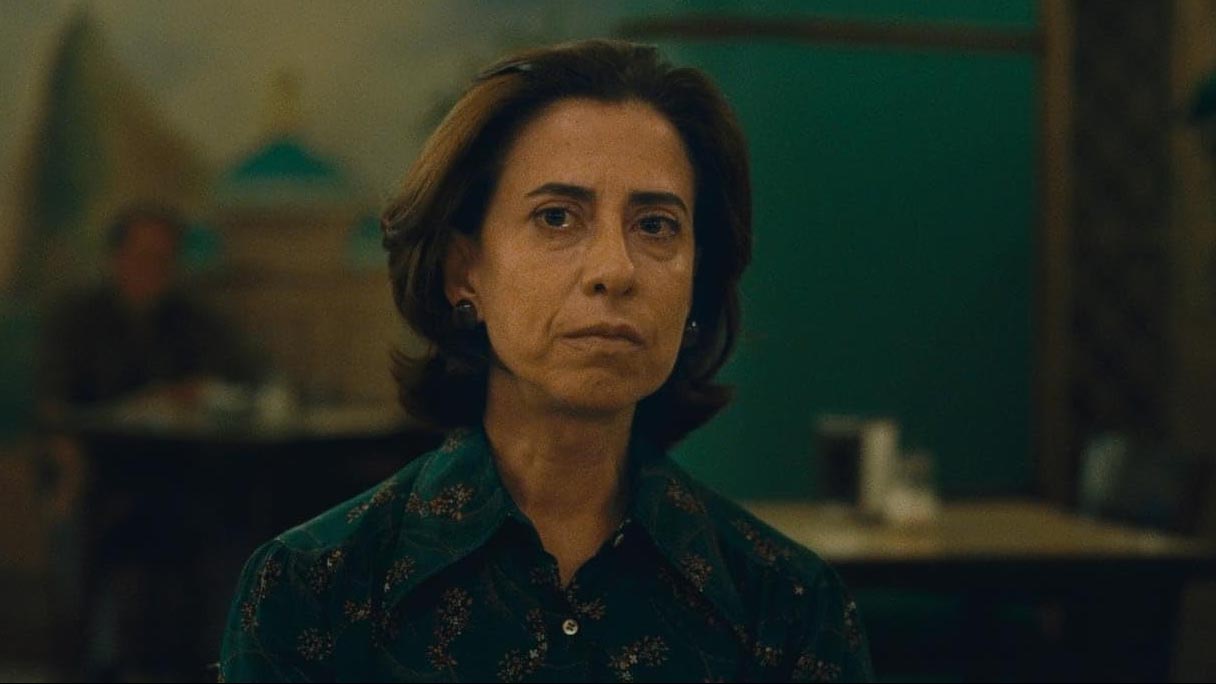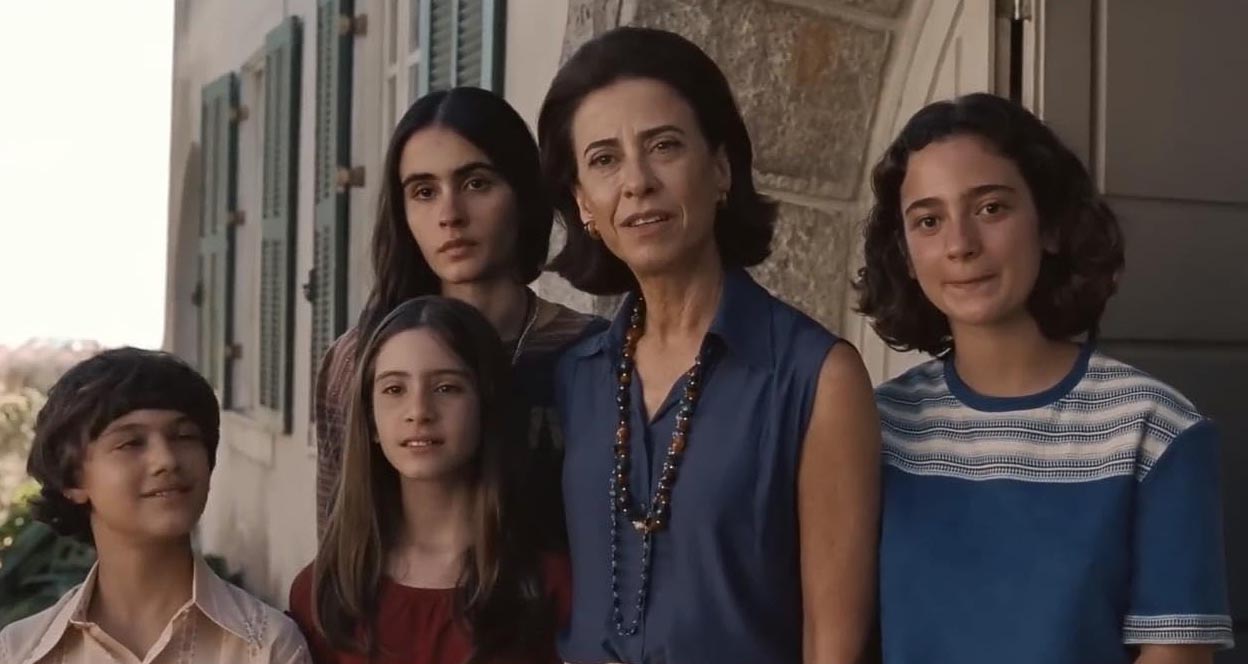‘The women were the silent heroines of that period’. (Salles)
‘When I saw that my mother was losing her memory, I thought it should be possible to keep her life forever’. Marcelo Rubens Paiva (son)
A stirring thriller/ family drama set in 1971 during the most agonizing period of the Military Dictatorship, ‘I’m Still Here’ is based on the book by Marcelo Rubens Paiva (son). It focusses on the resilience of one family’s suffering, when the Labour party PTB (Partido Trabalhista Brasileiro) ex-congressman husband and father of five, Rubens Paiva (father) is suddenly detained by the Secret Police for ‘interrogation’.

Rubens Paiva (Selton Mello) was a congressman in the previous government of ‘Jango’ Goulart, seen as socialist by the military government. It is considered that the spark for the military coup was lit when Goulart expressed sympathy for the causes of the mariner’s rebellion (where they petitioned for better living conditions). It led to the military coup of 1964. But Goulart was right. At the time, these young men were not given proper accommodation or married quarters. finding it hard to get a permit to be allowed to marry at all, let alone many other grievances. It was, initially, just an internal rebellion but it became the excuse for the extreme right-wing army groups to stage a coup, topple Goulart and install what was to become a brutal military dictatorship. In the early 1960s, Cuba 1959 was still fresh in people’s minds, America was just recovering from the Reds under the Beds, McCarthy era and a fear of communism taking a hold in the country was high, especially among certain factions of the country’s elite.
In ‘I’m Still Here’, having been a government congressman, Paiva is in a slightly privileged position and the family are managing to live as if nothing too drastic had occurred. It turns out to be far more precarious than they had imagined, because, by 1971, the time in which this film is set, the military government had been in power for seven years and things were beginning to drastically change.
The first early indicators of this are when the family’s teenage children and friends returning from a day out get aggressively stopped and frisked by police. It is a shock and they are unable to digest the significance.

Rubens Paiva (Selton Mello) and family in Rio de Janeiro
But more is to come. Largely due to state paranoia provoked by the emergence of a multitude of armed groups all over the country in the late 1960s, (including Rio de Janeiro and São Paulo). The government then introduced the notorious Acto Institucional 5 that removed Habeas Corpus and granted additional powers to the Secret Police. Led by Sérgio Paranhos Fleury, these Secret Police (DOI CODI) react with untold brutality, leading to torture and disappearances.

Rubens ( Selton Mello) and Eunice ( Fernanda Torres) in the good times.
Rubens Paiva had been participating in a non-violent group that is trying to help the opposition, delivering messages or helping dissidents to escape. The authorities have no concrete evidence, and are aware it is not well seen to be ill-treating a previous member of government, but nevertheless, Rubens Paiva is detained and taken away, never to be seen again.
His wife, Eunice Paiva (a magnetic Fernanda Torres) who had been assured he would return within hours, finds herself in limbo. There is the terrifying loss and realizing that she has no way of accessing information, creating a vacuum that cannot be filled.
Then Eunice with her eldest daughter is also detained for 12 days. The Secret Police stonewall her, refusing to give out any information at all about the whereabouts of her husband, claiming they only need information. Paiva and her daughter have a traumatic time in a notorious detention centre in Rio de Janeiro, spending nights hearing the screams of torture victims in neighbouring cells. Even after they are released, the Secret Police agents literally move into their home, as if they were under house arrest. The family are constantly under surveillance, as the authorities try to trap them into incriminating themselves or others as they claustrophobically watch their every step, making them live in terror that any false move could have them re-arrested.

Eunice Paiva played by Fernanda Torres incarcerated the the Secret Police
Shattered, Eunice struggles to keep her middle-class family together. Gone are the carefree days on the beach. She finds herself unable to access her husband’s bank accounts and has to resort to borrowing money from friends. Her situation is greatly exacerbated by the authority’s denials that her husband was ever taken, insinuating he had fled. Without this evidence she cannot even declare him officially dead. The moment that he was taken never to return is gut-wrenching for being so subtle and apparently mundane, all the more terrifying for being so. It hangs in the air as a remains a constant reminder of how easily lives can be turned upside down with no warning.
The family life details are beautifully put together with some flavours of the time, such as the girls using coca-cola to tan their skin. There is an honest look at this portrait of a family in time. All the while, the signs of oppression are encroaching on all aspects of life, from road blocks, young people being frisked, helicopters swirling in the skies and army lorries milling around full to the brim with soldiers in their blue helmets, gradually forming a chilling ring around this seemingly idyllic family by the beaches of Rio.
With her husband gone, Eunice is obliged to sell their magnificent mansion by the beach in Rio de Janeiro, to live in a flat in São Paulo, and, more painfully, to fire the long-term, and much-loved nanny/maid, Zezé. The uprooted children react in various ways due to the confusion of their father’s unexplained absence. Eunice tries hard to protect the younger children from the truth as she struggles to keep her family from falling apart.
 Fernanda Torres as Eunice
Fernanda Torres as Eunice
Walter Salles, concentrating on a minimalist style, avoiding melodrama, emphasises Eunice’s and her family’s resilience as they struggle through this impossibly difficult time. However, at times, this approach distances us from the person and it becomes harder to relate to her and empathize with her suffering. It is hard to maintain the suspense and it fades away. Despite being absorbed on a certain level, it was hard to shake off the feeling that we were on the outside looking in, which was a sensation that did not exist with Central Station where we could almost smell the mix of smoke and grease from the trains, as the mass of passengers moved about the station.

Walter Salles & Fernanda Torres
What remains shocking is that few people in Brazil could quite believe what was actually happening around them. In many South American countries, governments had historically come and gone, in some cases, coup after coup, but not all that much changed for the person in the street. Here this family is suddenly confronted with a totally different agenda. People that you would traditionally turn to for protection have become the ones you fear the most.

Fernanda Montenegro as the aged Eunice Paiva
Fernanda Montenegro gives a wonderful, compelling cameo performance as the aged Eunice at the end of the film. It is interesting to note that the lead, Fernanda Torres is the real-life daughter of Fernanda Montenegro. Fernanda Torres was nominated for Best Actress, but lost to Mikey Madison. She was however, made the Carnival muse of the Rio de Janeiro samba schools, as the festivities coincided with the 97th Academy awards.
‘I’m Still Here’ won Walter Salles the Oscar for Best International Film, being the first Brazilian to have achieved it. As he himself describes, it is a:
“… deeply personal yet universally resonant tale” … [with a] “unique blend of documentary realism and narrative improvisation that defines the film’s authentic portrayal of family dynamics.”
He was previously nominated for ‘Central Station’ in 1998, but lost to ‘Life is Beautiful’, the Holocaust comedy by Roberto Benigni, it was time to put that right.
I’m Still Here (2024)
Director: Walter Salles/ Book: Marcelo Rubens Paiva / Screenplay: Murilo Hauser and Heitor Lorega/Producers: María Carlota Bruno, Martine de Clermont-Tonnerre and Rodrigo Teixeira / DOP: Adrian Teijido / Editor: Affonso Gonçalves / Music: Warren Ellis.
Cast: Fernanda Torres/ Fernanda Montenegro/ Selton Mello/ Valentina Herszage/ Bárbara Luz/















